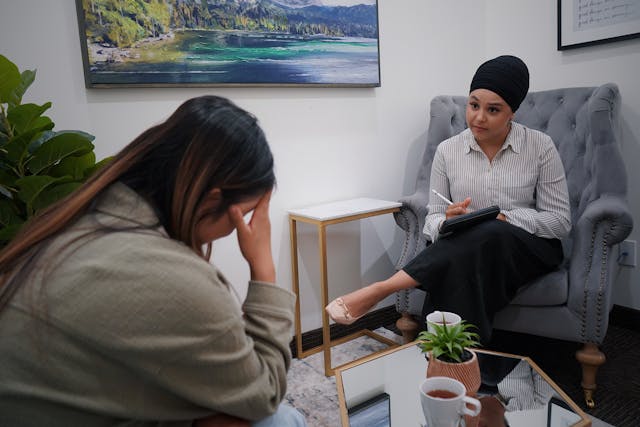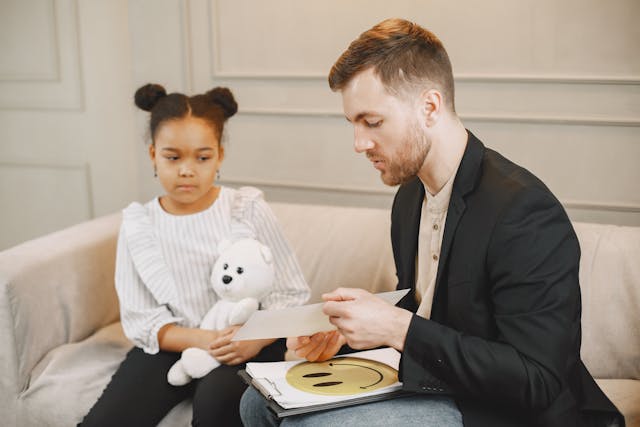Introduction
Group therapy has a rich history dating back to the early 20th century, pioneered by notable psychologists such as Jacob L. Moreno and Alfred Adler. Its roots lie in the understanding that individuals can benefit significantly from interacting with others facing similar challenges. Originally developed as a form of psychotherapy, group therapy has evolved into a widely practiced therapeutic approach across various mental health disciplines.
The primary purpose of group therapy is to provide a supportive and collaborative environment where individuals can explore their thoughts, emotions, and behaviors within a trusted community. Through shared experiences and interactions, participants gain insights, learn coping strategies, and develop interpersonal skills that contribute to their emotional well-being and personal growth.
What is group therapy?
Group therapy is a form of psychotherapy where a small group of individuals, typically ranging from 5 to 15 participants, come together under the guidance of a trained therapist to work on various aspects of their emotional and psychological well-being. This therapeutic approach is designed to address a wide range of issues related to both physical and mental health, including but not limited to anxiety, depression, trauma, addiction, and relationship problems.
In group therapy, participants engage in structured group sessions that provide a supportive environment for exploration and healing. Through sharing experiences, insights, and challenges with one another, individuals can gain a deeper understanding of themselves and others, fostering personal growth and development.
The therapeutic process in group therapy involves active participation and engagement from all members. Through active listening and empathetic communication, participants learn to validate each other's experiences and offer support and encouragement. This collaborative approach promotes a sense of belonging and community, which is essential for enhancing emotional health and resilience.
Group therapy can take place in various settings, including in-person sessions conducted in therapy offices, hospitals, or community centers, as well as online therapy platforms. This flexibility allows individuals to access support and resources based on their preferences and needs.
One of the significant advantages of group therapy is its effectiveness in addressing issues that may be challenging to tackle in individual therapy sessions. For example, individuals struggling with substance abuse may benefit from the peer support and accountability offered in a group setting, facilitating their journey toward recovery.
What are the key characteristics of group therapy sessions?
Knowing the characteristics of group therapy is important because it provides clarity and guidance for both participants and facilitators. For therapists and facilitators, knowledge of these characteristics enables them to create and maintain a conducive environment for growth and healing.
Now, let's explore the key characteristics of group therapy that contribute to its effectiveness:
Supportive environment
Group therapy provides a supportive environment where individuals can connect with others facing similar challenges. This sense of community fosters a feeling of belonging and acceptance, creating a safe space for sharing personal experiences and emotions.
Therapeutic process
Central to group therapy is the therapeutic process guided by a trained therapist or clinical social worker. Participants engage in discussions, activities, and exercises through structured therapy sessions to promote self-reflection, insight, and personal growth.
Communication skills
Group therapy emphasizes the development of effective communication skills. Participants learn to express themselves openly and respectfully, practice active listening, and provide constructive feedback to others. These skills are invaluable for building healthy relationships and navigating interpersonal dynamics.
Relationship building
Group therapy offers opportunities for building meaningful connections with others. As group members share their stories and support one another, they develop trusting relationships beyond the therapy session. These connections can provide ongoing encouragement and validation, enhancing the therapeutic experience.
Self-reflection
A key characteristic of group therapy is the encouragement of self-reflection. Through discussions, journaling, and guided exercises, participants gain insights into their thoughts, feelings, and behaviors. This self-awareness is essential for personal growth and making positive changes in one's life.
Online therapy option
In today's digital age, group therapy is increasingly available online, providing convenient access to support and resources. Online therapy platforms offer a range of group sessions tailored to different needs and preferences, allowing individuals to participate from the comfort of their own homes.
Engaging in activities for self-care
Group therapy may incorporate fun and engaging activities for self-care, such as mindfulness exercises, creative arts therapy, or relaxation techniques. These activities promote emotional well-being and help participants develop coping strategies for managing stress and enhancing their overall quality of life.
Addiction recovery support
For individuals struggling with addiction, group therapy can be a valuable resource for recovery. Group sessions provide a non-judgmental space for sharing experiences, discussing challenges, and receiving support from peers who understand the journey toward sobriety.
Open-ended questions
Therapists often use open-ended questions to encourage members to explore their thoughts and feelings more deeply. These questions prompt reflection and stimulate meaningful discussions, allowing participants to gain valuable insights and perspectives.
10 Discussion Questions for Group Therapy
Engaging in group therapy can be a transformative experience, and having thought-provoking discussion questions can deepen the exploration and promote meaningful connections among participants.
So, what group therapy discussion questions should be asked during group therapy? We've compiled a list of 10 questions that we think are effective in eliciting meaningful conversation and guiding clients toward positive discussion.
Using your professional experience and understanding of each client's needs and wants, you should use these discussion questions to guide your group therapy session meaningfully and cohesively. Remember that some clients will be reserved in how they communicate, whereas others will be fairly talkative and open.
Here are 10 discussion questions that can spark insightful conversations during group therapy sessions:
1. What brings you to group therapy today, and what are your goals for participating?
This question encourages participants to reflect on their reasons for seeking therapy and sets the stage for goal setting. By articulating their motivations and aspirations, individuals clarify their intentions and establish a sense of purpose for their participation in the group. It also promotes accountability and commitment to the therapeutic process.
2. How do you typically cope with stress or difficult emotions, and are there any new strategies you'd like to explore?
Exploring coping mechanisms provides insight into participants' current strategies for managing stress and challenges. Individuals can expand their emotional regulation and resilience toolkit by discussing potential new approaches. This question promotes self-awareness and empowers participants to actively engage in their healing journey.
3. What patterns or themes do you notice in your relationships with others, and how do they impact your well-being?
Reflecting on relationship dynamics fosters awareness of recurring patterns and their impact on emotional health. Participants gain insight into their interpersonal behaviors and communication styles, facilitating deeper self-understanding and potentially uncovering areas for growth and improvement.
4. How do you define self-care, and what self-care practices resonate with you?
Defining self-care encourages participants to prioritize their well-being and explore activities that nourish their mind, body, and spirit. Sharing self-care practices promotes mutual support and inspiration within the group, fostering a culture of compassion and wellness.
5. Can you share a recent experience where you felt challenged or triggered, and how did you navigate it?
Discussing challenging experiences promotes vulnerability and empathy within the group. By sharing coping strategies and lessons learned, participants offer valuable insights and support to one another, reinforcing a sense of community and resilience.
6. What are your strengths and areas for growth, and how can you leverage them in your journey towards healing?
Identifying strengths and growth areas builds self-confidence and agency. Participants recognize their inherent resilience and potential for personal development, empowering them to take proactive steps toward positive change.
7. How do you view vulnerability, and what barriers do you face in expressing your true thoughts and feelings?
Exploring vulnerability promotes authenticity and connection within the group. Participants examine the role of vulnerability in fostering meaningful relationships and overcoming emotional barriers, paving the way for deeper self-expression and interpersonal connection.
8. What role does forgiveness play in your life, and are there any resentments or grievances you're ready to let go of?
Reflecting on forgiveness encourages participants to release emotional burdens and cultivate inner peace. By acknowledging resentments and grievances, individuals take steps towards healing and liberation from past hurts, fostering emotional well-being and resilience.
9. How do you cultivate resilience in adversity, and what support systems do you rely on during difficult times?
Discussing resilience strategies promotes resourcefulness and adaptive coping skills. Participants share resilience-building techniques and support networks, fostering mutual encouragement and solidarity within the group.
10. Looking ahead, what changes or intentions would you like to set for yourself, and how can the group support you in achieving them?
Setting intentions fosters goal-directed behavior and accountability. Participants articulate their aspirations and enlist the group's support in realizing their goals, fostering a collaborative and empowering environment for personal growth and transformation.
While these questions are not a comprehensive list of everything you can ask during a group therapy session, they should hopefully provide an overview of the types of discussions you want to enable. In addition to asking meaningful questions, you can incorporate various treatment methods, including group therapy activities, tasks, and even games.
Key takeaways
Asking questions in group therapy is a powerful tool for facilitating exploration, promoting insight, building connections, and fostering active engagement among participants. This ultimately contributes to their overall well-being and personal progress.
Questions play a crucial role in therapy and encourage participants by stimulating reflection, dialogue, and deeper exploration of thoughts, emotions, and experiences. Open-ended inquiries help therapists uncover underlying issues, promoting self-awareness and personal growth among group members. This approach fosters collaboration, mutual support, and a sense of empathy and camaraderie, encouraging active participation and enhancing involvement in the therapeutic process.
By creating a support system, questions enable individuals to comfortably share and explore sensitive topics, making the therapeutic experience more effective.






.jpg)

.jpg)


.jpg)




.jpg)
.jpg)


.jpg)


.jpg)



